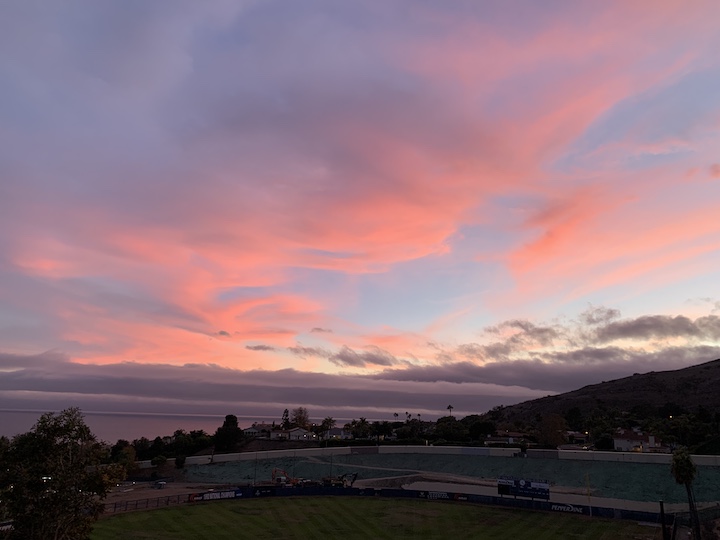
Lush greenery, scenic ocean views and mountains for days.
Pepperdine’s campus offers a natural environment few other universities can match. Students find the campus’ setting helps them focus and refresh from intense studying, but the call of the beach is sometimes distracting and can lead to strong cases of FOMO.
Annaby Kanning, first-year 3/2 engineering major, said this campus has helped her stay motivated and focused in her academics.
“I think it has made me feel more grateful while I’m studying,” Kanning said. “Looking out and seeing all the beauty around me has helped me to still be grateful even when it does get hard.”
The environment of a college campus is a key factor in student success. A Pepp Post poll of 50 students found that 51 % agreed that location is very important in their ability to focus when studying.
Where Pepperdine students study and why
The physical characteristics of a learning environment have a significant impact on learners emotionally, cognitively and behaviorally, Ken A. Graetz, director of teaching, learning and technical services at Winona State University, wrote in a 2006 Educause Review.
First-year biology major Megan Anderson said she spends close to four hours a day doing school work outside of class time. She said where she does her work depends on the time of day and the content at hand.
“During the day I like to go out to the Lighthouse patio,” Anderson said. “It’s always nice to have that view out there while I’m studying and it’s pretty for reading and not super loud.”
But when she has large amounts of time-consuming work, she chooses Payson.
“When I have a lot of stuff that I need to just get done and get out of the way I like to go to the library,” Anderson said. “I feel like it’s really easy to just find a spot where I can sit down and focus for a long amount of time.”
Kanning agreed and said she also chooses Payson for her intense studying.
“I like to study in the Payson Library,” Kanning said. “That’d be my No. 1.”
The Pepp Post poll found that almost 35 % of students choose Payson as their usual study location, second behind student dorms.
The poll found that there is not one study space that the majority of students choose. There are multiple popular locations for students to complete their work.
Pepperdine’s natural beauty and the benefits of the outdoors
Pepperdine’s peaceful scenery can positively impact students’ mental health and their performance in school.
Anderson feels the benefits of Pepperdine’s location when studying becomes overwhelming.
“I can have that view there when I need to just take a moment and refocus,” Anderson said.
Psychology Professor Janet Trammell extensively studies the effects of natural environments on cognition and mood.
“Definitely compared to an urban environment an outdoor, natural environment is going to be much better for your emotions, your affect, your stress than that urban environment,” Trammell said.
When people spend time in natural spaces their stress reduces, allowing them to focus much better, Trammel said. “Spending time in natural environments tends to reduce stress and tends to increase or enhance positive mood,” Trammell said. “By reducing stress we are increasing our attentional resources, they have been drained by our daily activities and now they get to recover.”

Tramell said this campus is also very good for her personally.
“Well, it’s hard to have a bad day,” Trammell said. “When something happens and the day may not be going well, I just walk outside and then I can look at the ocean, I can sit, I can usually find a quiet place I can sit and take it in and I feel better.”
Having a campus with so many unique opportunities for outdoor activities definitely provides joy for students, allowing them to debrief long days.
“I think during the week it definitely is very peaceful and it’s nice to just be able to go outside and walk,” Kanning said. “It’s nice to have the sun and other aspects (on-campus) that make you feel happier.”
Students should not actually study outdoors
While, yes, dedicating time to nature each day is important for success and mental health, it is not the best idea to actually study outdoors, Trammell said.
“If you were actually to try to study outside or do work outside I think that would be really hard because it would be way more distracting,” Trammell said. “There’s lots of research in cognitive psychology and in other fields that you want to reduce distraction, as little distraction as possible and when you’re outdoors there’s a lot more.”
Jake Nichols, senior international studies major, has experienced this distraction when studying outdoors.
“That’s why I have to study inside, which feels really counterproductive, like being in Malibu and I spend the time when I’m studying inside,” Nichols said. “But that’s just because that environment (outside) is not good for me to study in. Some people can, but I can’t.”
Trammell said the outdoors are best used in between work for a break or after work as a bonus.
Spending even a short amount of time outside will significantly impact students’ performance academically.
“A lot of students say I don’t have time to do this but the thing is you don’t have time not to,” Trammell said. “It’s going to help. There is a wealth of evidence that getting exposure to natural environments is just good for you, physically, mentally, cognitively.”
FOMO and taking campus for granted
With the constant exposure to such a natural environment that has many activities and social events specific to life on the beach, it can be easy for students to prioritize fun over school. And when they don’t, they can feel like they are missing out.
Kanning said it can be difficult to focus on studying during the weekend when there are so many other things she would rather be doing with the ocean so close.
“Beauty can be a bit distracting whenever you feel like there’s so much to do but here you are in the library and you haven’t been experiencing what’s right in front of you,” Kanning said. “Whenever you’re studying during the weekend it feels like everyone else is gone and the ocean is right there, but you’re still in the books, so in that way it can definitely feel like FOMO.”
Since Pepperdine’s environment is the day-to-day for students, many find themselves taking it for granted and realizing they don’t utilize it as much as they could.
Nichols said this thought crosses his mind when he thinks about graduating and moving.
“Oh well, the beach will always be there, but I’m gonna graduate pretty soon, I’m not going to stay in California,” Nichols said. “I’m going to move somewhere where there’s not going to be a beach, and pretty soon I’m going to realize how much I miss having that.”
Wishard said she can definitely take living here for granted.
“It goes unnoticed and therefore it can get taken for granted but living nestled in the mountains overlooking an ocean definitely does something good for my mental health,” Wishard said. “It’s nice to be somewhere so beautiful.”
Ava Heinert completed the reporting for this story in Jour 241 under the supervision of Dr. Christina Littlefield and Dr. Theresa de los Santos. Dr. Littlefield supervised the web version of the story.



